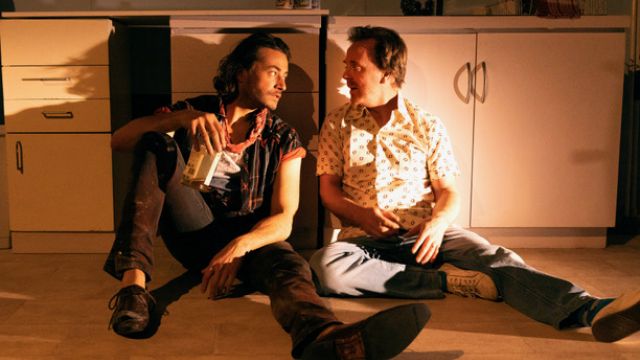True West
Sam Shepard called his 1980 play True West a ‘character study’ and it is that. It’s a situation rather than a story, a raw and visceral case of sibling rivalry. In this excellent production, the outward layers of two very different brothers’ personas are peeled away, leaving them confronting – but maybe still evading - who they are.
Austin (Justin Hosking), a married-with-kids Hollywood screenwriter, is housesitting for his Mom in her suburban Los Angeles house while she is on vacation in Alaska. But the Mojave Desert is not far away. Austin is working on a screenplay, a ‘period piece’ love story he believes he’s sold to producer Saul Kimmer (Kevin Summers). Suddenly, his older brother Lee (Mark Diaco) bursts in from the desert – unexpected and threatening. Lee pours scorn on Austin and his screenplay, claiming that he has a great story, way better than Austin’s period piece…
The writing, the wardrobe choices and the superb performances of Diaco and Hosking tip us off as to the revealing McGuffin of the two screenplays. We guess that Austin’s love story movie is a play-it-safe cliché piece and Lee’s bare bones ‘story’ seems immediately exciting with its elements of sexual jealousy, revenge, and a desperate car chase into the desert. Lee’s story (just a set-up, no ending supplied) is pure Lee. The only catch is there is no way can Lee write it… The two screenplays parallel the conflicts on stage. It’s literacy versus illiteracy, cliché versus risky, bland versus raging emotional, comfortable suburban versus desert survivor, straight versus criminal – and implicitly, ‘masculine’ (whatever that means) versus soft and wussy.
Shepard provides almost no ‘back story’ to explain why Lee is a near illiterate, violent petty criminal and Austin is an Ivy League university educated screenwriter – save reference to their alcoholic father who somehow lives some kind of life out in that mythical desert. It’s a beautiful moment, in a temporary lull in hostilities, when the brothers, both drunk, talk about their father. Austin is, of course, dismissive verging on contemptuous, while Lee reveals a sentimental sympathy for the old bastard.
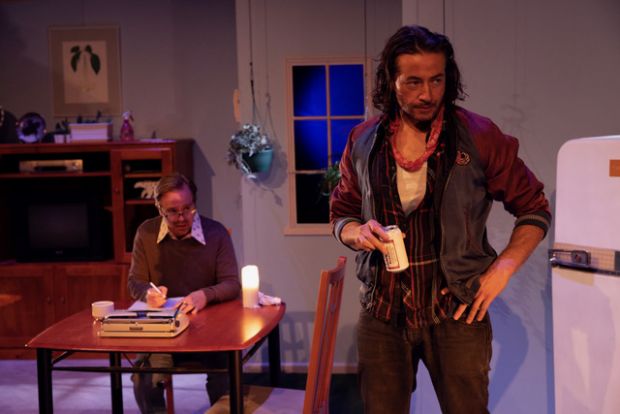
Peter Mumford’s set design emphasises the 1980s suburban ‘normal’ – such a contrast to the conflicts - even sourcing a period stove and refrigerator. Dimitri Golovko’s sound design of ceaseless crickets and the howl of coyotes reminds us that Nature – the Desert – is eve close, just outside the windows.
Diaco and Hosking introduce their characters so well, so skilfully that we glimpse from the start their true natures. Diaco brings his remarkable intensity to Lee, but here, for all his bluster, Lee is consumed by resentment and horrible anxiety that he is a nobody. It’s an implied but never acknowledged fear that results in senseless violence – like the real but metaphoric smashing of Austin’s typewriter. Hosking has his Austin segue beautifully into a childish drunk. Despite his reasonable, educated front, he buys into the absurd competition with his brother. The one time Austin does make a stand he looks merely stubborn and childish.
Lee’s real violence and threats of violence toward Austin, however, seem rather implausible. When a character knocks the other to the ground or stands over him with a golf club raised to strike, you do wonder how these characters can come back from that and just… resume.
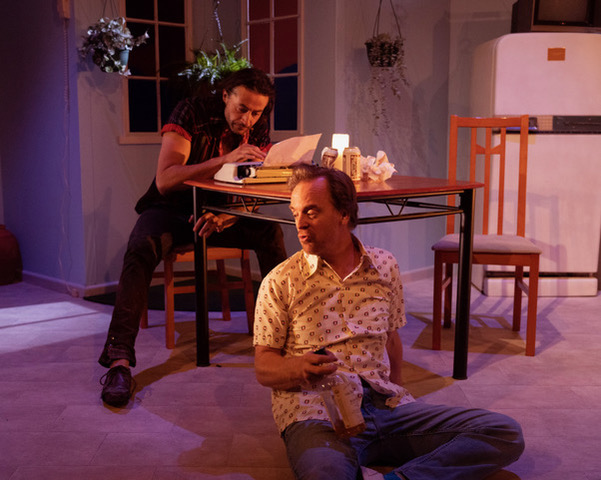 Image: From Left: Mark Diaco as Lee, and Justin Hosking as Austin. All photography above by Greg Elms @gregelmsphoto
Image: From Left: Mark Diaco as Lee, and Justin Hosking as Austin. All photography above by Greg Elms @gregelmsphoto
On a second visit: Mark Diaco and Justin Hosking switch roles…
The plan with this production is that Diaco and Hosking alternate in the two roles.
So, when Hosking switches to play the violent ‘tough guy’ drifter Lee and Diaco plays the educated ‘reasonable’ screenwriter Austin, it raises the question of casting.
Here, with the switch of roles (which could be a mere gimmick), we see not just two skilful transformations, but we gain different insights into and interpretations of Shepard’s text and characters. No matter how good, charismatic, attractive, charming or threatening an actor is, casting (or the wrong casting) immediately and inevitably changes the meaning of the drama. 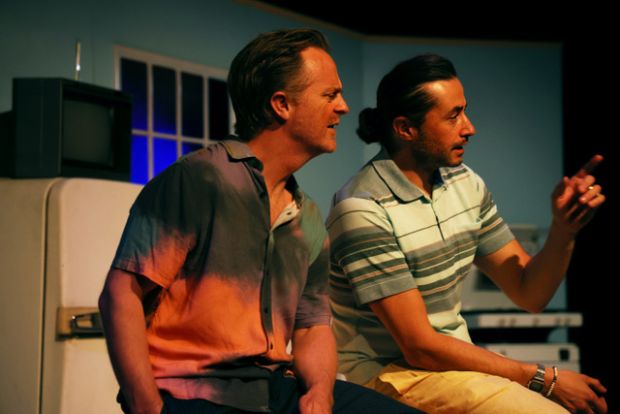
Image: From Left: Justin Hosking as Lee, and Mark Diaco as Austin. Photography by Darcy Yuille.
With True West, it’s impossible to ignore one’s immediate first impression of these two actors’ physicality. Mark Diaco, with his hawk-like features, is simply bigger. Thus his Lee is immediately more threatening. He sneers. He doesn’t need to shout. Of course, the play strips away that front, that character armour, and thus there is pathos in the reveal of the ‘real’ Lee.
Hosking is perhaps the more plastic actor, able to inhabit – or disappear inside - his characters. As Austin, he is polite, careful, ‘urban’ – and as the smaller man is believably intimidated – at first. But that sets up what looks like an uneven contest in which Lee has not much of an adversary to push against. When Austin fights back and the characters are both drunk and more than a little crazy, the reversal is startling.
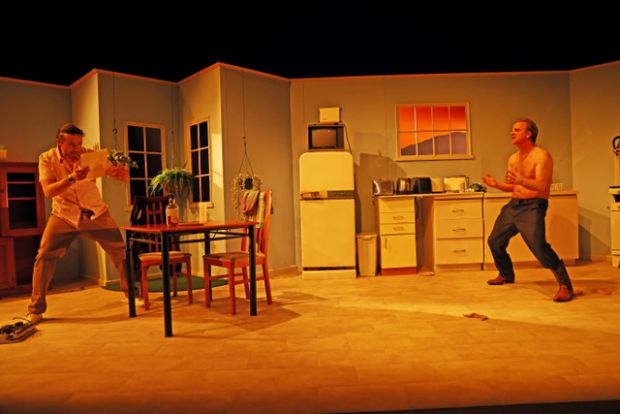
But then, allowing for the contrasting physicality of the two actors, Hosking adds and takes Lee somewhere else. His Lee pushes harder, is louder and nastier to dominate his brother Austin. Hosking adopts a ruined whiskey-and-cigarettes voice at aggressive volume. His clothes are dirty and torn, and we can almost smell him. He also plays Austin as if the man is disabled by some illness that may be killing him; he interrupts himself, he staggers, he clutches his head, he even falls down. His constant drinking is desperate and is maybe more self-medication than hard-drinkin’ cowboy. He mocks his brother – but doesn’t want him to change… Whether or not this Lee can charm producer Kimmer – and beat him at golf – is maybe more of a stretch.
At the same time, Diaco, as Austin, in impeccable white linen trousers, has to make himself smaller – at first - hunch his shoulders and reign in his characteristic intensity to portray the educated but anxious ‘soft’ younger brother, fearful of Lee. He has to make us believe that his screenplay is his last shot – that he’s washed up in Hollywood, that he’s as much a failure as Lee. In the second act, Diaco can release his supressed physicality and anger, and credibly fight Lee.
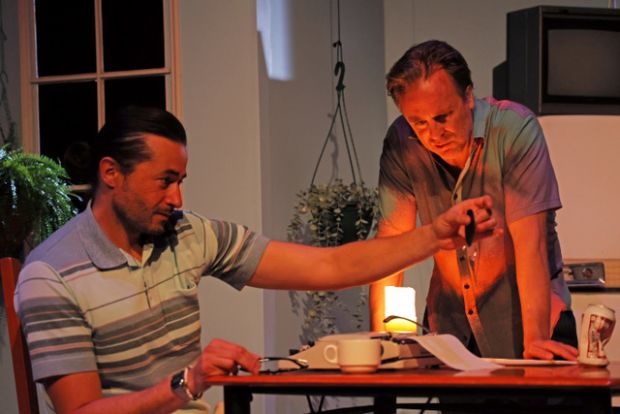
In this iteration – Hosking as Lee, Diaco as Austin – we feel that this contest has been going on since the two of them were boys. They’re still boys. It’s the same contest. When their Mom returns, her indifference confirms that impression.
To see both ‘versions’, so to speak, is a very exciting theatrical experience – not just to see director Lee Mason’s changes of emphasis and the two actors’ choices and inventions – but also the richness of Shepard’s text that can accommodate different interpretations without changing its essential meaning.
True West as a study of what it means or might mean to be a ‘a man’ isn’t at all dated. What is ‘a man’? As the concept of man as protector and provider becomes more and more redundant, what’s a bloke to do? As presented so forcefully here, the question is just as pertinent.
Michael Brindley
Photography of second visit by Darcy Yuille.
Subscribe to our E-Newsletter, buy our latest print edition or find a Performing Arts book at Book Nook.

